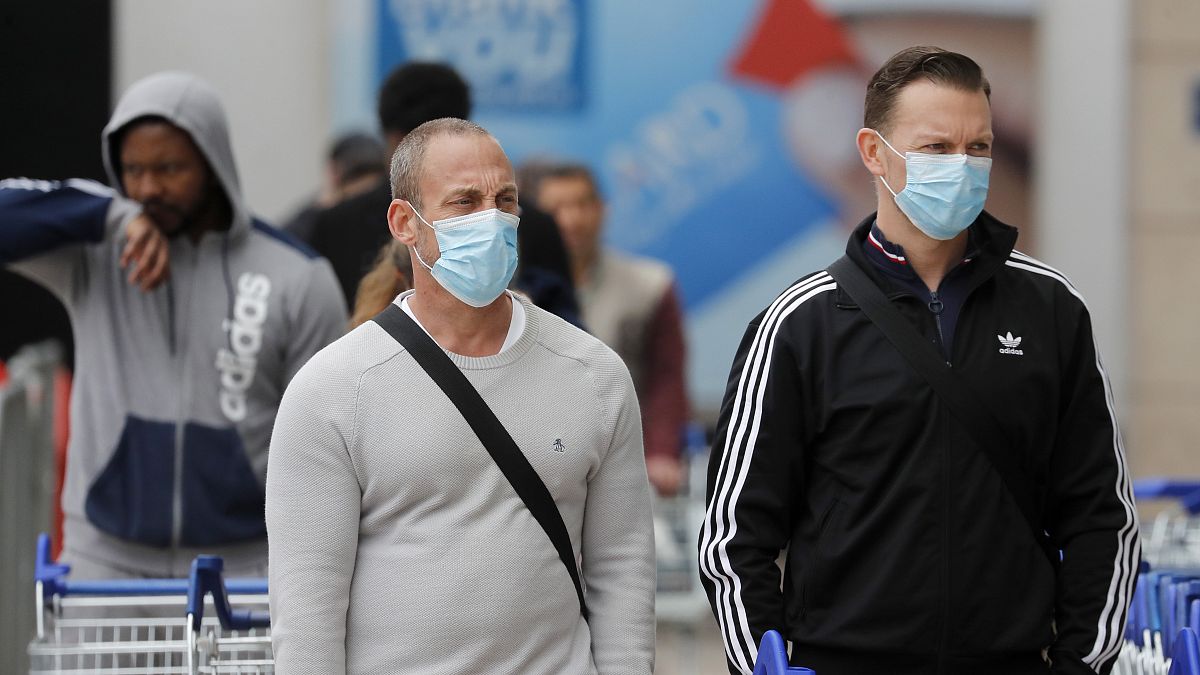A key question that has dominated discussion is whether a person can be infected more than once by the virus. So, what do we know?
Scientists are working to discover all they can about the behaviours of the COVID-19 coronavirus, from how it manifests itself in the body to how it spreads between people.
The scale of scientific research into the virus is "unprecedented," immunologist Prof Luke O'Neill told Euronews. "We have a huge amount of knowledge about various aspects," he said.
A key question that has dominated discussion is whether a person can be infected more than once by the virus. So, what do we know?
"We don't fully know"
"That's the really important question and the answer is that we don't fully know, is the truth," Prof O'Neill said.
"But there is good evidence that we are probably protected if you were infected," he added.
Prof O'Neill pointed to experiments that have been done with monkeys who were infected with the virus and when the tried to reinfect them, they couldn't.
"Secondly, we know that we make a big antibody response to this virus. Loads of antibodies are churning in your system. They are the virus busters," he said.
"If you carry these antibodies, that means you've had the virus and that means you're no longer infectious," he added.
How long does immunity last?
Although there is "good evidence" to suggest that you can become immune to the virus, how long this lasts has yet to be determined.
"People who work in other coronaviruses say about a year, maybe, which is good," Prof O'Neill said. "If you do get a second infection it is much milder, but we don't fully know as it's a new virus," he said, adding that there is "optimism that if you are infected once you should be protected".
European exit strategies, including in France, have acknowledged the low rate of immunity among their population, estimating it to stand between 1% and 6%, with countries such as Ireland warning that lifting restrictions too soon could lead to a significant rebound in cases.
The question as to whether a person could be infected more than once gained traction back in March, where a local government in Japan said it had recorded the first case of a person who has tested positive after apparently recovering from an earlier bout.
According to NHK, the woman, in her 40s, is a tour bus guide who travelled with tourists from Wuhan, China, in January. She tested positive for COVID-19 on January 29 and was given the all-clear by February 6.
Just weeks later, the woman began exhibiting symptoms and was tested again - only for it to return as another positive result.
We spoke with experts in March, who at the time stressed that nothing is really impossible while research is ongoing to find out everything there is to know about the virus.
But in terms of getting infected twice, they generally said other scenarios are more probable.
Connor Bamford, a virologist at the Wellcome-Wolfson Institute for Experimental Medicine at Queen's University in Belfast, told Euronews it is "unlikely" the woman was re-infected but underlined there was still a lot to learn.
He said: "This is potentially an important development but there’s still a lot we don’t know.
"Also, this is likely to be a rare event so it might not make much of an impact during the outbreak."
Meanwhile, Fabienne Krauer, an epidemiologist in Oslo, Norway, said: "We cannot know if this is a re-infection unless we explicitly know that the woman cleared the virus in between."
She went on to say that if it were the case as stated in Japanese reports that two tests in a month had returned positive, then "we can't tell if this is a real re-infection or a persistent infection."
Is it a persistent infection?
Short answer: it could be.
Philip Tierno, a professor of microbiology and pathology at NYU School of Medicine, told Euronews one possibility could be that the woman was "originally colonised" by the SARS-like illness - meaning it lingered in her body without her being "truly infected".
He said she may then have experienced "a very mild upper respiratory course, which did not evoke her immune system" and later tested negative if the test did not pick up the virus somewhere in her body.
"Later, she developed a significantly lower respiratory infection," he added.
READ MORE:
How effective are masks, closed borders, screenings and quarantines?
'My kids exhaust me more than COVID-19,' says doctor in quarantine with his family
Put more simply, according to Bart Haagmans, a virologist at the Erasmus Medical Centre in Rotterdam, a mild initial infection could result in a limited response from the immune system.
This could allow the coronavirus to "replicate upon a second exposure," he said.
Any other possibilities?
Both Tierno and Bamford noted that it could just simply be a mistake made with the testing procedure.
"Tests are not perfect," Tierno said.
But, according to Bamford, these concerns about re-infection are not yet a priority.
He said: "We should keep an eye on this but I don’t think it is anything to worry about now.
"The vast, vast majority of cases are from first infections and these are the ones we should worry about."
